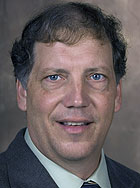On the heels of headlines trumpeting Washington Mutual’s fall, the biggest bank failure in U.S. history, economic analysts seem quicker to cite similarities between the current financial crisis and the Great Depression of the 1930s.
But such dire predictions are nothing new to economist Steven Fazzari, Ph.D., professor of economics at Washington University in St. Louis. Fazzari, along with his co-author and former WUSTL student Barry Cynamon, has been predicting the emergence of serious financial problems for several years.

Steven Fazzari
In a paper titled “Household Debt in the Consumer Age: Source of Growth — Risk of Collapse,” forthcoming in the Berkeley Electronic Press journal Capitalism and Society, the researchers interpret the financial history of the past two decades in a framework developed by the late WUSTL economist Hyman Minsky, whose writing identified systematic tendencies for modern capitalism to create financial booms followed by wrenching crises and recessions.
Cynamon and Fazzari explain why and how the household consumption boom stimulated growth and moderated recessions since the mid-1980s.
“Many people want to figuratively ‘slap the wrists’ of American consumers for not saving enough,” Fazzari says, “but we need to recognize that American consumer spending was a significant source of strength for both the U.S. and world economies for a long time.”
The authors also identify a dark side of the boom: rising financial fragility in the household sector. As Fazzari puts it, “The economic engine of household spending and rising debt has run out of gas.”
As a result, Fazzari argues that we have now reached the “Minsky moment,” the time when an unsustainable financial boom turns to collapse. “The serious consequences for employment and economic growth in this crisis can be mitigated, but not eliminated, by the defensive financial bailouts that the federal government has initiated,” Fazzari says.
Editor’s note: A .PDF of Fazzari and Cynamon’s paper available at: http://artsci.wustl.edu/~fazz/Cyn Fazz Dist 0807.pdf
Fazzari is available for phone, e-mail and broadcast interviews. Washington University has VYVX and ISDN lines available free for news interviews.